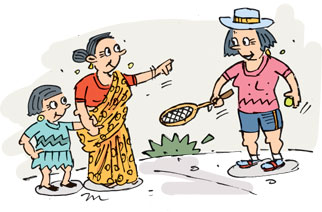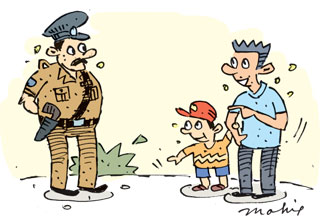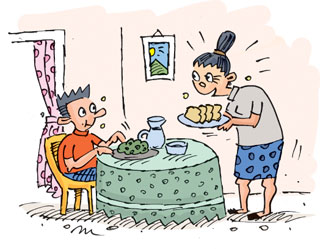|

by R. S. Karunaratne
Relative clauses with ‘Who’
We can join two sentences by turning one into a main clause and the
other into a subordinate clause. When we do so, there will be a subject
and a finite verb in each clause.
1. Rani visited her aunt.
She was a seamstress.
Rani visited her aunt who was a seamstress.
|

This is the girl who won the table tennis competition. |
2. I met some German tourists.
They were climbing Sri Pada.
I met some German tourists who were climbing Sri Pada.
3. That is the police officer.
He fined me for driving without wearing a seat belt.
That is the police officer who fined me for driving without a seat belt.
4. Shanthi is an undergraduate.
She is following a course in biotechnology.
Shanthi is an undergraduate who is following a course in biotechnology.
5. James and Peter are twins.
They want to go abroad for higher studies.
James and Peter are twins who want to go abroad for higher studies.
‘Who’ is the subject of the subordinate clause. It usually describes
a noun. We use a relative clause with ‘who’ to describe a person or
people.
1. This is the girl.
She won the table tennis competition.
This is the girl who won the table tennis competition.
2. The security guard caught hold of a youth.
He was trying to steal a fountain pen.
The security guard caught hold of a youth who was trying to steal a
fountain pen.
3. I thanked the driver and the conductor.
They were very polite.
I thanked the driver and the conductor who were very polite.
4. George is a job agent.
He promised to find employment for us.
George is a job agent who promised to find employment for us.
5. I do not like some of my neighbours.
They enjoy loud music.
I do not like some of my neighbours who enjoy loud music.
The finite verb of the relative clause must agree with its subject.
1. She needs to talk to him.
He is a medical specialist.
She needs to talk to him who is a medical specialist.
|

That is the police officer who fined me for driving without a
seat belt.
|
2. I met Caldera.
He is a leading criminal lawyer.
I met Caldera who is a leading criminal lawyer.
3. I always go to school with Piyal and Harsha.
They are my best friends.
I always go to school with Piyal and Harsha who are my best friends.
4. We talked to the prisoners.
They were very unhappy.
We talked to the prisoners who were very unhappy.
5. This is the dental surgeon.
He extracted my teeth without causing pain.
This is the dental surgeon who extracted my teeth without causing pain.
[Activity]
Join the following sentences using
‘who’. Check your answers with the key.
1. This is the teacher.
He taught me English.
..............................................................................
..............................................................................
2. The police are going to arrest a suspect.He is living in a jungle
hideout.
..............................................................................
..............................................................................
3. I saw Miss Asia.
She is very beautiful.
..............................................................................
..............................................................................
4. We cheered the runners.
They will win the cup.
..............................................................................
..............................................................................
5. Nimal and Sanju study law.
They want to be lawyers.
..............................................................................
..............................................................................
6. Manoharan is a bridge engineer.
He lives next door.
..............................................................................
..............................................................................
7. We work for a rich businessman.
He owns three garment factories.
..............................................................................
..............................................................................
8. Piyum always consults doctors.
They do channel practice.
..............................................................................
..............................................................................
9. I made a complaint against the salesman. He was rude to me.
..............................................................................
..............................................................................
10. Marvan is a cricketer.
He will bring credit to his country.
..............................................................................
..............................................................................
****************
[Key ]
1. This is the teacher who taught me English.
2. The police are going to arrest a suspect who is living in a jungle
hideout.
3. I saw Miss Asia who is very beautiful.
4. We cheered the runners who will win the cup.
5. Nimal and Sanju who want to become lawyers, study law.
6. Manoharan is a bridge engineer who lives next door.
7. We work for a rich businessman who owns three garment factories.
8. Piyum always consults doctors who do channel practice.
9. I made a complaint against the salesman who was rude to me.
10. Marvan is a cricketer who will bring credit to his country.
****************
Starters:
Differences between
"Would you like?"and
"Do you like?"
'Would you like?' and 'Do you like?' appear to give the same meaning.
However,
we use them in different situations.
1. We use 'Would you like?' when we offer something to somebody.
A: Would you like some tea?
B: Yes, please.
A: Would you like some apple juice?
B: No, thank you. I don't like apple juice.
|

Would you like to have bread and butter? |
A: What would you like: tea, coffee or lemon juice?
B: Tea, please.
2. We use 'Would you like?' when we invite somebody to a function or
event.
A: Would you like to attend my birthday party?
B: Yes, of course.
A: Would you like to have lunch with me tomorrow?
B: I'd love to.
A: Where would you like to go this weekend?
B: I haven't decided yet.
3. We use 'I would like' as a polite way of saying 'I want'.
I'd like some gravy, please. (In a hotel)
I'd like to read the introduction.
I'm thirsty. I'd like a drink.
Note the difference
Would you like to go to the theatre tonight? (Tonight)
Do you like going to the theatre? (In general)
I'd like to have some ice-cream. (I want it now)
I like ice-cream. (In general)
A: Would you like to have bread and butter? (Now)
B: Yes, please.
A: Do you like bread and butter? (In general)
B: Not always.
[Activity ]
Choose the correct form by underlining it. Check your answers with
the key.
1. Do you like / Would you like some coffee?
2. Do you like / Would you like apples?
3. Do you like / Would you like to have fried rice?
4. What do you like / What would you like to drink?
5. Do you like / Would you like to go out at the weekend?
6. I like / I would like pineapples but I don't eat them very often.
7. I'm tired. I like / I'd like to lie down.
8. Do you like / Would you like swimming?
9. Do you like / Would you like a cup of coffee?
10. Do you like / Would you like a sandwich?
************
[Key ]
1. Would you like, 2. Do you like, 3. Would you like, 4. What would
you like, 5. Do you like, 6. I like, 7. I'd like, 8. Do you like, 9.
Would you like, 10. Would you like
************ |

